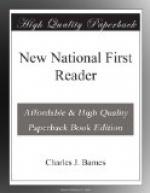5th.—That the “Script” from which the pupil gets his first and most lasting impressions should be of large size and accurate form, and not of the nondescript character usually found in books of this class. That it should be free from superfluous line and flourish, and yet have grace and beauty. That it should be adapted for both copying and reading.
6th.—That the lessons should be largely “conversational in style," to cultivate flexibility of voice and to break up the dreary monotone so frequently heard among children.
7th.—That the lessons of a book of this grade should not average more than seven “new words." That all such words should appear at the commencement of lessons, and be familiar to the pupil. That this method secures careful gradation, and is in marked contrast with the old custom of having from fifteen to twenty-five.
8th.—That “Outline Drawings” of the objects first presented to pupils should be made in the presence of the class, as it stimulates them to draw, and thus makes easy and profitable the copying of the “Script Exercises.”
9th.—That the schoolbook of to-day must be beautifully and copiously illustrated. That there must be variety as well as excellence, both in drawing and engraving. That well-known and famous artists must be secured, such as Harper, Fredericks, Church, Lippincott, Eytinge, White, Beard, Weldon, Thulstrup, Cary, Moser, Weaver, and Share; and such engravers as Karst, Wigand, French, Held, Davis, Hellawell, etc.
10th.—That the exercises must be instructive as well as interesting, and that no artificial system of vowel classification ought to interfere with the free and natural use of words.
11th.—That a book of this kind should be suited to the wants of graded and ungraded schools, there evidently being nothing in the one not readily adaptable to the other.
12th.—That every book of this class should contain a collection of brief extracts from standard literature to be committed to memory.
13th.—That this book is constructed on the above principles.
ALPHABETS.
[Script: A a] A a
[Script: B b] B b
[Script: C c] C c
[Script: D d] D d
[Script: E e] E e
[Script: F f] F f
[Script: G g] G g




